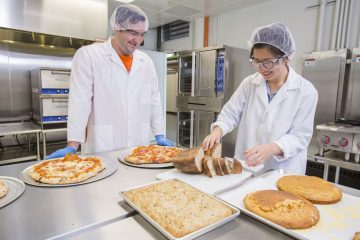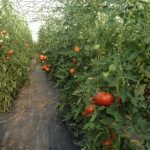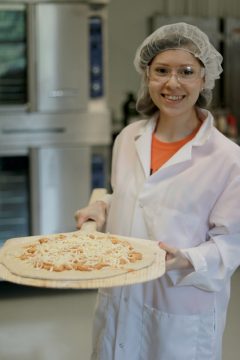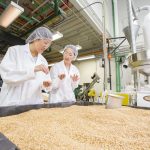 The Illinois Sustainable Food Project brings together the Department of Food Science and Human Nutrition, the Department of Crop Sciences, and University Housing Dining Services at the University of Illinois. Grain and produce grown as part of research and teaching programs, student initiatives, and local collaborations are processed by students in the FSHN Pilot Processing Plant into finished products that are served in the University Dining Halls. The finished products typically travel less than five miles from field to fork, and create innovative student learning and research opportunities.
The Illinois Sustainable Food Project brings together the Department of Food Science and Human Nutrition, the Department of Crop Sciences, and University Housing Dining Services at the University of Illinois. Grain and produce grown as part of research and teaching programs, student initiatives, and local collaborations are processed by students in the FSHN Pilot Processing Plant into finished products that are served in the University Dining Halls. The finished products typically travel less than five miles from field to fork, and create innovative student learning and research opportunities.
Partners
 Department of Food Science & Human Nutrition
Department of Food Science & Human Nutrition
- Department of Crop Sciences
- Sustainable Student Farm (SSF)
- Multifunctional Woody Polyculture Site
- Woody Perennial Polyculture Site
- Wheat & Corn Breeding and Organic Research Programs
- Assorted other programs and faculty
- University Housing Dining Services
Funding

The Student Sustainability Committee has provided funds for a portion of the SSF’s start-up costs and equipment for the FSHN-PPP. University Housing Dining Services funds a large portion of the ongoing operations of the SSF and the associated costs of processing the product at the FSHN-PPP through purchasing the products for use in the dining halls.
Student Involvement
 Student involvement is a cornerstone of the ISFP, providing various educational experiences for students in classes, participating in internships, or as paid student employees in any of the various farms or facilities.
Student involvement is a cornerstone of the ISFP, providing various educational experiences for students in classes, participating in internships, or as paid student employees in any of the various farms or facilities.
- Selecting, growing, and harvesting produce at the various farm locations
- Participating in research programs led by faculty members that produce grains or produce from the farm locations
- Developing nutritious recipes using the products available from campus
- Designing, installing, and maintaining processing systems that safely process or preserve food for consumption
- Operating food processing lines and learning about safe food handling
- Designing menus around sustainable and/or local food production practices at the Dining Halls and Bevier Cafe
- Final preparation of products for Dining Halls, Bevier Cafe, and catering events
Current & Future Capabilities
Tomato-based sauces
 2,000-5,000 lb batches of sauce packaged into half-gallon pouches
2,000-5,000 lb batches of sauce packaged into half-gallon pouches- Produce pizza, pasta, marinara, and other sauces
- Served at specialty pizza events at several locations, goal to produce 100% of sauce served at Dining Halls
Fermented Food Products
- 1,600 L of fermenter space available in various tanks ranging from 1-300 L
- Common products are hot sauces, kim chi, and sauerkraut
- Hot peppers are fermented separately and then blended for use as a condiment or as an ingredient in wing or other sauces
Grain & Flour Processing
 Stone mill capable of cleaning & milling up to 400 lbs of dry grain per hour
Stone mill capable of cleaning & milling up to 400 lbs of dry grain per hour- Capacity to mill, sift, blend, and package flour in 2-10 lb heat-sealed or 25-50 lb sewn bags using semi-automatic gravity filler
- Laboratory is setup to analyze grain and flour characteristics. Lab is equipped with mills, Perten Inframatic, Doughlab, RVA, and Falling Number equipment, protein analysis, and moisture balances and ovens.
- Large assortment of test mills and baking equipment are available
Minimally Processed Produce
- Capacity to clean, dice, shred, or cube products
- Ability to blanch, package, and seal with or without vacuum and freeze
Purees, Jellies, and Jams
- Capacity to produce and refine purees using destoners, pulpers, finishers, and comitrol grinder
- Have ability to reduce jellies and jams, but considering additional investment into specialized equipment. Can produce small quantities of fruit leathers
- Packaging capacity includes various piston-fillers for semi-automatic filling of containers
Beverages
- Cold press juice line in process of being installed (Goodnature X-6)
- Hot-fill pasteurization and bottling line capable of (1,200) 16 oz. bottles per hour or bag-in-box pouches
- Capable of handling apples and other fruits, vegetable-based juices, and berries including currants
Extruded Savory Snacks & Cereals
- Completing procurement of a $3.5M extrusion line capable of producing direct and indirect-expanded products
- Upstream processing to include milling, blending, and mixing
- Downstream processing to include fluidized bed drying, tumble seasoning, and plastic pouch packaging
Outreach
The ISFP works with Extension and entities like the Artisan Grain Collaborative to share knowledge gained through the program’s efforts and to share resources with others working in similar areas.
